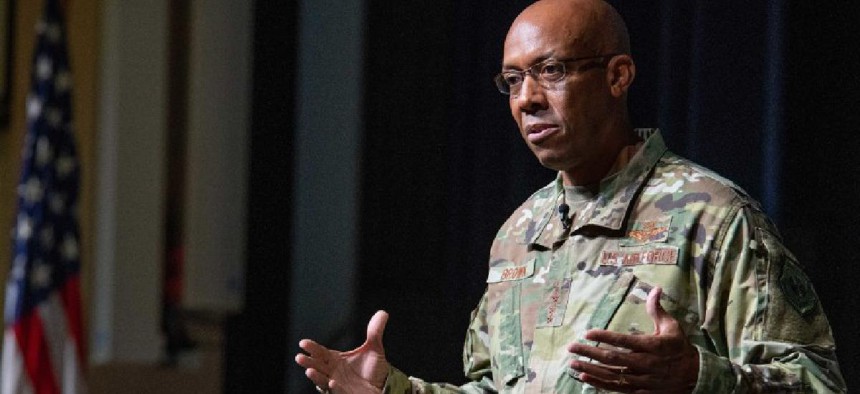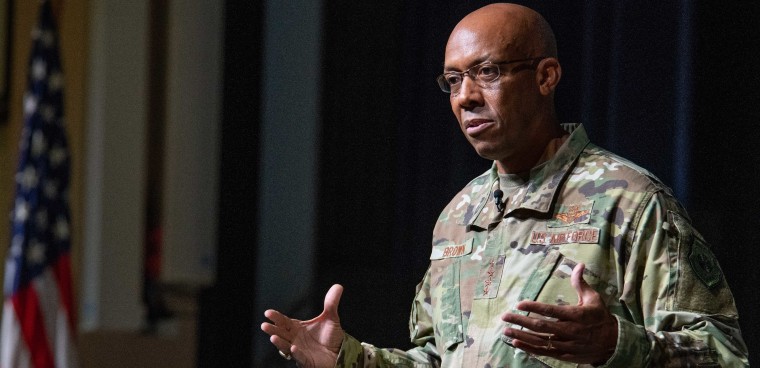USAF chief looks to combat extremism in the ranks

To create a better environment for all service members, Gen. Charles Q. Brown Jr., the Air Force's chief of staff said leadership will have to lay out "what our expectations are for those who are to be a part of our force."

To combat extremism in its ranks, the Air Force, and Defense Department more broadly, will have to do more than have frank conversations about race and sexual assault. It will need a cultural reset with an eye towards talent management, according to the USAF's chief of staff.
"I want to create an environment where all of our airmen can reach their full potential and extremism is not one of those that allows that to happen whether it be sexual assault, discrimination -- there's so many factors that can actually detract from our airmen, our service members reaching their full potential. And extremism is one of those," Gen. Charles Q. Brown Jr., the Air Force's chief of staff, said during a Jan. 25 Washington Post Live event.
Brown said he was "shocked" and "hurt" watching the insurrection at the Capitol building on Jan. 6, noting that while displays of the Confederate flag have been an unsettling, but not rare, sight throughout his military service, "to see it up on the Capitol and to be walked through the Capitol gives me an indication that where we are as a nation -- there is a bit of a division."
"It gives you a sense of how some people really feel," he said.
The Joint Chiefs of Staff released a memo Jan. 12 condemning the violent insurrection on Jan. 6, saying "any act to disrupt the Constitutional process is not only against our traditions, values, and oath; it is against the law."
But to create a better environment for all service members, Brown said leadership will have to lay out "what our expectations are for those who are to be a part of our force."
That includes being open and transparent with hard conversations, like those around race, but also changing talent management practices, such as breaking up officer promotional boards to include developmental categories and deliberately increasing diversity on promotional boards and candidate pools.
"You need to have a big foundation coming in at the entry level and then you've got to sustain that over time to ensure that you have individuals of diverse backgrounds available as you get to the senior ranks," Brown said.
Mentoring, coaching or additional training are also important, he said, because some candidates may not feel qualified and abstain from applying for promotions. "We've got to actually nudge and pull and actually purposefully manage to make sure we have diverse candidates that can compete."
There's also the issue of why people stay or leave military service and the conditions that create it. An Air Force inspector general report released in December found consistent, widespread disparities in how Black airmen were treated, disciplined, promoted, and viewed their chain of command compared to their white counterparts.
For example, young black airmen were twice as likely to be involuntarily discharged for misconduct compared to whites, according to the report. Black service members were also 72% more likely than white service members to receive a commanding officer's non-judicial punishment under Article 15 of the Uniform Code of Military Justice. The review also found that Black service members were 57% more likely to face a courts martial.
On the talent management front, the report found that while many Black service members were nominated for professional military education, they were rarely invited to attend. Moreover, Black service members were underrepresented as non-commissioned and commissioned officers. For full-time civilian personnel, the report found that Black workers are underrepresented in GS-13 through Senior Executive Service (SES) grades.
Brown said, mentioning the study, that while race and diversity conversations have opened up in the last year, he wants to "ensure that we do something that is meaningful, that's sustainable, and that endures well after me...something that becomes part of the culture of the Air Force going forward."
In that same vein, Brown initiated a review of emblems, patches, nicknames, and insignia in the Air Force to make sure they are inclusive and help determine what needs to be changed.
"There's things that we've had put in place where there's a patch, a coin, a motto that may have been okay or accepted in the past. But over time as you start to open the aperture and start talking about disparity and being more inclusive, you can alienate different parts of the Air Force if we're not conscious of it," Brown said.
Brown's comments come after similar ones made by Defense Secretary Lloyd Austin during his confirmation hearing Jan. 19 and as dozens of National Guard members tapped to protect the Capitol and other federal property during the inauguration were dismissed amid concerns of ties to extremist beliefs.
Austin, a retired Army general and the first Black defense secretary, committed to "stamping out" racism and sexual assault in the military.
"We also owe our people a working environment free of discrimination, hate and harassment. If confirmed, I will fight hard to stamp out sexual assault to rid our ranks of racists and to create a climate where everyone fit and willing has the opportunity to serve this country with pride and with dignity," Austin said.
"The Defense Department's job is to keep America safe from our enemies. But we can't do that if some of those enemies lie within our own ranks," he said.



